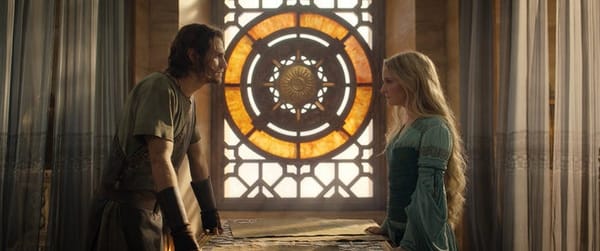Loki was a trans story
The Marvel show played with gender dynamics much more than is typical from Disney

(Writer’s note: SPOILERS, obviously. Also please don’t send me death threats, this is just how I experienced the show, it’s fine to disagree.)
Towards the end of the season finale of Marvel Studios’ Loki, a hugely popular TV show on Disney+, the two main characters, Loki and Sylvie share a kiss. Moments later, the Marvel universe literally exploded, forever changed.
At first blush, it’s just another kiss between a man and a woman on screen. But Sylvie is actually a “variant” of Loki. Without explaining the whole premise of the show, which revolves around the antics of the two Lokis and a fascistic organization called the Time Variance Authority, which polices the universe for so-called “variants,” or those who did something in their lives to disturb their predetermined timeline.
Some viewers blanched at the idea of the two Lokis coming together romantically, after all, they are supposed to be two versions of themselves. But I saw the two differently. For me, Sylvie is Loki’s “female side,” and the kiss shared was the Loki gender collective learning to love themselves.
In Norse mythology, and in the Marvel comic books, Loki has always been gender fluid, capable of changing genders at anytime for any reason. But before the show, the MCU version of Loki had always been male-presenting.
The introduction of Sylvie instantly endeared her to my heart. The TVA snatched her away as a small child, as she was playing make believe with some Asgardian dolls. We never learned why the TVA decided to take Sylvie, but it could have just been because she was a girl when she was supposed to be a boy. The scene of her getting hauled into a time portal by a heavily armed police figure hit home.
When I was a small child, I used to secretly pretend to be a girl in my room, sometimes dressing in some of the clothes my mom had stored in the crawlspace behind my closet. At the time, I worried about getting caught, and the potential repercussions. Would my parents decide they didn’t want me anymore? Would I get hauled off to face some grim-faced bureaucrat? Would the police come for me?
I was little, I had no idea what the price would be for my secret thoughts and playtime.
I’m not the only trans person to find Sylvie’s story relatable. Countless friends of mine that I’ve discussed the show with have talked about their connection to her. Trans writer Julia Serano wrote an excellent piece a few weeks ago about how people’s discomfort with the Loki/Sylvie romance could be related to internalized transmisogyny.
Over the course of the show, Loki first comes to terms with his status as a variant, and he and Sylvie eventually bond over their mutual mischievousness. At one point, Loki acknowledges his bisexuality, the first time a major MCU character has openly stated that they’re queer.
To me, it was deeply symbolic that the moment Loki fully embraces his love for Sylvie, his female self, the universe explodes into a multiverse, with all its scary and potentially wonderful possibilities. It felt familiar to my own transition, where at first everything blew up, I got divorced, moved out of my house away from my kids, and then slowly built up a new life, eventually moving into a better career and moving to a new city.
My own multiverse, if you will.




